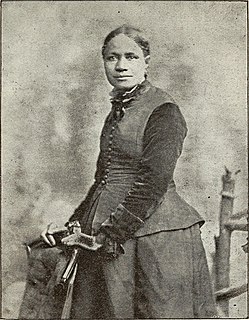A Quote by George Washington Carver
The centre of his world was the south where he was born in slavery some 79 years ago and where he did his work as a creative scientist.
Related Quotes
A life that stood out as a gospel of self-forgetting service. He could have added fortune to fame but caring for neither he found happiness and honor in being helpful to the world. The centre of his world was the south where he was born in slavery some 79 years ago and where he did his work as a creative scientist.
Behold the Child among his new-born blisses
A six years' Darling of a pigmy size!
See, where 'mid work of his own hand he lies,
Fretted by sallies of his mother's kisses,
With light upon him from his father's eyes!
See, at his feet, some little plan or chart,
Some fragment from his dream of human life,
Shaped by himself with newly-learned art.
There are three ways in which a man becomes a slave. He may be born into slavery, or forced into it, or he can deliberately accept his servitude. All three forms flourish in the modern world. Men are born and forced into slavery in Russia and her satellites states. Men in the free world invite slavery when they ask the government to provide complete security, when they surrender their freedom to the "Welfare State."
The books of the great scientists are gathering dust on the shelves of learned libraries. And rightly so. The scientist addresses an infinitesimal audience of fellow composers. His message is not devoid of universality but its universality is disembodied and anonymous. While the artist's communication is linked forever with its original form, that of the scientist is modified, amplified, fused with the ideas and results of others and melts into the stream of knowledge and ideas which forms our culture. The scientist has in common with the artist only this: that he can find no better retreat from the world than his work and also no stronger link with the world than his work.
No scientist or student of science, need ever read an original work of the past. As a general rule, he does not think of doing so. Rutherford was one of the greatest experimental physicists, but no nuclear scientist today would study his researches of fifty years ago. Their substance has all been infused into the common agreement, the textbooks, the contemporary papers, the living present.
I grew up and I've worked with people who have been very present, a) either always jumping to whatever is most modern technologically advanced sort of thing, or b) people in this industry, like Kevin Smith, who, his communication with his fans is hugely connected to his success. And he was talking about that years ago. And David Bowie was doing that years ago. And Prince was doing that years ago.
Slavery's crime against humanity did not begin when one people defeated and enslaved its enemies (though of course this was bad enough), but when slavery became an institution in which some men were 'born' free and others slave, when it was forgotten that it was man who had deprived his fellow-men of freedom, and when the sanction for the crime was attributed to nature.
It is obvious that Paul did not regard prayer as supplemental, but as fundamental-not something to be added to his work but the very matrix out of which his work was born. He was a man of action because he was a man of prayer. It was probably his prayer even more than his preaching that produced the kind of leaders we meet in his letters.
It is said that the Negro is ignorant. But why is he ignorant? It comes with ill grace from a man who has put out my eyes to makea parade of my blindness,--to reproach me for my poverty when he has wronged me of my money.... If he is poor, what has become of the money he has been earning for the last two hundred and fifty years? Years ago it was said cotton fights and cotton conquers for American slavery. The Negro helped build up that great cotton power in the South, and in the North his sigh was in the whir of its machinery, and his blood and tears upon the warp and woof of its manufactures.
When Arthur Ashe plays tennis, his purpose each day is to play the game in a way he has never played it before. It may be a backhand he uses, one that he may never have used before in that circumstance. His play is a fresh integration of his world at the instant of action. A really great scientist has the whole past at his disposal. At any instant he is rebuilding the world, molecule by molecule, in his subconscious. That is what you want in an athlete or a scientist.




































